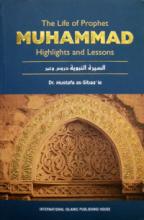The Prophet of Mercy Website
Muslim World League - Global Commission for Introducing the Messenger
His Life at a Glimpse
By Aelfwine Mischler Aelfwine Mischler
Although Muslims do not actually celebrate the Muslim new year in the way other people celebrate their respective new year, the first day of the lunar month of Muharram is a legal holiday in many Muslim countries.
The Islamic calendar is counted from the year of Prophet Muhammad’s flight from Makkah to Madinah in September 622 CE, known as the Hijrah (or hegira in English from Latin from Arabic). This journey is one of the most important events in Islamic history.
The Prophet Muhammad made many treaties with the local tribes and the chiefs of states the surrounding the Arabian Peninsula and very strictly adhered to the terms of his treaties. When once he entered into any with anyone he was never first to break the treaty. This was one of the cardinal principles of his policy. He always honored his promises and pacts with other people and advised his followers to do the same. He always enjoined upon his commanders not to break their trust. The Qur'an commands:
The news about the Prophets (peace be upon him) departure from Makkah had already spread fast. Eagerly expecting his arrival, the Ansaars used to go out after morning prayers to the outskirts of the city and await his arrival until there was no more shade and the sun became unbearable. Then, as it was the hot season, they returned to their homes, sad and disappointed.
FUGITIVES OF THAQIF
The warriors of Thaqif who fled from Hunayn returned to Taif. They closed the gates of the city after storing stocks of food enough to serve them for a year. Thus, they prepared themselves in time for another encounter with the Muslims.
Preface
REVENGE ---- A BINDING OBLIGATION
BACKGROUND OF THE CONQUEST
Some of the tribes were still trapped in the delusion that the rise of Islam was transient like a cloudburst, whose tide would be stemmed before long. It was therefore necessary to warn or even threaten such people before they device an opportunity to strike at the Muslims. The expedition of Tabuk had the desired effect on such lukewarm tribes much in the same way as the conquest of Mecca had gone a long way in clearing away the clouds of opposition.
BANU QURAYDHA'S BREACH OF FAITH
Not long after his arrival in Madinah, the Prophet (peace be upon him) forged a covenant between the Ansaar and Muhaajirun to which the Jews were also included and were guaranteed protection of life and property as well as freedom of professing their faith. The covenant, which was reduced to writing, accepted certain rights of the Jews and also put them under certain obligations. Some of the important considerations of this covenant were as follows:
In the second year of the Hijrah, during the month of Ramadan, the Muslims came up against the infidels in the decisive battle of Badr which was to prove the turning point not only in the destiny of Islam but of the entire human race.






